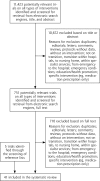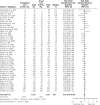Transitional Care for Patients With Congestive Heart Failure: A Systematic Review and Meta-Analysis
- PMID: 26553896
- PMCID: PMC4639382
- DOI: 10.1370/afm.1844
Transitional Care for Patients With Congestive Heart Failure: A Systematic Review and Meta-Analysis
Abstract
Purpose: We aimed to determine the impact of transitional care interventions (TCIs) on acute health service use by patients with congestive heart failure in primary care and to identify the most effective TCIs and their optimal duration.
Methods: We conducted a systematic review and meta-analysis of randomized controlled trials, searching the Medline, PsycInfo, EMBASE, and Cochrane Library databases. We performed a meta-analysis to assess the impact of TCI on all-cause hospital readmissions and emergency department (ED) visits. We developed a taxonomy of TCIs based on intensity and assessed the methodologic quality of the trials. We calculated the relative risk (RR) and a 95% confidence interval for each outcome. We conducted a stratified analysis to identify the most effective TCIs and their optimal duration.
Results: We identified 41 randomized controlled trials. TCIs significantly reduced risks of readmission and ED visits by 8% and 29%, respectively (relative risk = 0.92; 95% CI, 0.87-0.98; P = .006 and relative risk = 0.71; 95% CI, 0.51-0.98; P = .04). High-intensity TCIs (combining home visits with telephone followup, clinic visits, or both) reduced readmission risk regardless of the duration of follow-up. Moderate-intensity TCIs were efficacious if implemented for a longer duration (at least 6 months). In contrast, low-intensity TCIs, entailing only followup in outpatient clinics or telephone follow-up, were not efficacious.
Conclusions: Clinicians and managers who implement TCIs in primary care can incorporate these results with their own health care context to determine the optimal balance between intensity and duration of TCIs. High-intensity interventions seem to be the best option. Moderate-intensity interventions implemented for 6 months or longer may be another option.
Keywords: congestive heart failure; meta-analysis; outcomes research; systematic review; transitional care; utilization.
© 2015 Annals of Family Medicine, Inc.
Figures



Similar articles
-
Systemic pharmacological treatments for chronic plaque psoriasis: a network meta-analysis.Cochrane Database Syst Rev. 2021 Apr 19;4(4):CD011535. doi: 10.1002/14651858.CD011535.pub4. Cochrane Database Syst Rev. 2021. Update in: Cochrane Database Syst Rev. 2022 May 23;5:CD011535. doi: 10.1002/14651858.CD011535.pub5. PMID: 33871055 Free PMC article. Updated.
-
Professional, structural and organisational interventions in primary care for reducing medication errors.Cochrane Database Syst Rev. 2017 Oct 4;10(10):CD003942. doi: 10.1002/14651858.CD003942.pub3. Cochrane Database Syst Rev. 2017. PMID: 28977687 Free PMC article.
-
Systemic pharmacological treatments for chronic plaque psoriasis: a network meta-analysis.Cochrane Database Syst Rev. 2017 Dec 22;12(12):CD011535. doi: 10.1002/14651858.CD011535.pub2. Cochrane Database Syst Rev. 2017. Update in: Cochrane Database Syst Rev. 2020 Jan 9;1:CD011535. doi: 10.1002/14651858.CD011535.pub3. PMID: 29271481 Free PMC article. Updated.
-
Clinical service organisation for heart failure.Cochrane Database Syst Rev. 2012 Sep 12;(9):CD002752. doi: 10.1002/14651858.CD002752.pub3. Cochrane Database Syst Rev. 2012. Update in: Cochrane Database Syst Rev. 2019 Jan 08;1:CD002752. doi: 10.1002/14651858.CD002752.pub4. PMID: 22972058 Updated.
-
Topical anti-inflammatory treatments for eczema: network meta-analysis.Cochrane Database Syst Rev. 2024 Aug 6;8(8):CD015064. doi: 10.1002/14651858.CD015064.pub2. Cochrane Database Syst Rev. 2024. PMID: 39105474 Free PMC article.
Cited by
-
Study protocol for a hospital-to-home transitional care intervention for older adults with multiple chronic conditions and depressive symptoms: a pragmatic effectiveness-implementation trial.BMC Geriatr. 2020 Jul 10;20(1):240. doi: 10.1186/s12877-020-01638-0. BMC Geriatr. 2020. PMID: 32650732 Free PMC article.
-
Improving continuity of patient care across sectors: study protocol of a quasi-experimental multi-centre study regarding an admission and discharge model in Germany (VESPEERA).BMC Health Serv Res. 2019 Mar 29;19(1):206. doi: 10.1186/s12913-019-4022-4. BMC Health Serv Res. 2019. PMID: 30925879 Free PMC article.
-
Diagnosis and Management of Heart Failure in Elderly Patients from Hospital Admission to Discharge: Position Paper.J Clin Med. 2021 Aug 10;10(16):3519. doi: 10.3390/jcm10163519. J Clin Med. 2021. PMID: 34441815 Free PMC article. Review.
-
Effectiveness of hospital-to-home transitional care interventions and consultation for implementation in Sudan: a scoping review of systematic reviews.Front Health Serv. 2023 Dec 14;3:1288575. doi: 10.3389/frhs.2023.1288575. eCollection 2023. Front Health Serv. 2023. PMID: 38162192 Free PMC article.
-
The outcomes of treatment for homebound adults with complex medical conditions in a hospital-at-home unit in the southern district of Israel.Isr J Health Policy Res. 2024 Feb 14;13(1):8. doi: 10.1186/s13584-024-00595-y. Isr J Health Policy Res. 2024. PMID: 38355553 Free PMC article.
References
-
- Naylor MD. Transitional care of older adults. Annu Rev Nurs Res. 2002;20:127–147. - PubMed
-
- Naylor MD, Aiken LH, Kurtzman ET, Olds DM, Hirschman KB. The care span: the importance of transitional care in achieving health reform. Health Aff (Millwood). 2011;30(4):746–754. - PubMed
-
- Scarborough P, Bhatnagar P, Wickramasinghe K. Coronary Heart Disease Statistics. London, England: British Heart Foundation; 2010.
-
- Zaya M, Phan A, Schwarz ER. The dilemma, causes and approaches to avoid recurrent hospital readmissions for patients with chronic heart failure. Heart Fail Rev. 2012;17(3):345–353. - PubMed
-
- Anderson C, Deepak BV, Amoateng-Adjepong Y, Zarich S. Benefits of comprehensive inpatient education and discharge planning combined with outpatient support in elderly patients with congestive heart failure. Congest Heart Fail. 2005;11(6):315–321. - PubMed
Publication types
MeSH terms
Grants and funding
LinkOut - more resources
Full Text Sources
Other Literature Sources
Medical
